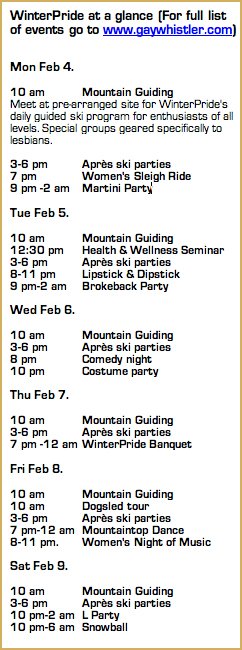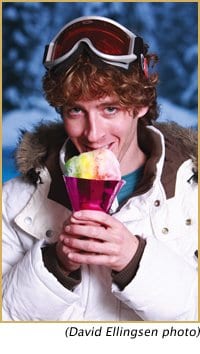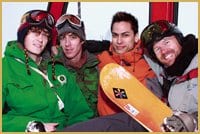With nearly 100 events and activities spanning seven days in February, organisers of Whistler’s world-famous gay ski week say this year’s gathering on and off the slopes will be better than ever.
Although the event has been in a state of uncertainty in recent years, participants and organisers emphatically state that community strength, loyalty and a commitment to founder Brent Benaschak’s vision will keep Whistler’s gay ski week going in 2008 and beyond.
The week has evolved since its early days, notes Dean Nelson, community relations for Alpenglow Productions, which is presenting WinterPride in Whistler for the third year in a row.
“We are not a circuit party event exclusively anymore,” he points out.
These days, Nelson likens WinterPride to Pride festivities in the summer.
“When you look at the name WinterPride, you look at summer Pride events which encompass parades and events — everything that makes you proud to be a gay person. We’ve really embraced the Pride concept and we’re bringing that to the mountain for a whole week of being who you are.”
According to Nelson, WinterPride is now one of the largest promoted gay events in the world and will be seen by 20 million people through every form of media. A far cry from its humble origins.
Blair Hirtle who helped Benaschak co-organise the event in its infancy when it was known as Altitude, remembers when Whistler was little more than a Husky station and three chair lifts. It was through skiing that he made his connections with the gay community.
“I chose skiing because it was not a team sport. I remember it was kind of lonely because I had trouble finding other gay men to ski with,” says Hirtle, “but when Altitude came along it brought everyone together. It’s great to bring communities together, especially in sport and athleticism.”
Benaschak launched Altitude in 1993 as a way to draw business from his bed and breakfast in New York to his bed and breakfast in Whistler. Two hundred people attended Altitude in its first year.
Jean Yves Pigeon, who helped organise Altitude for nine years, recalls how it all began: with a picnic on the mountain.
“A bunch of us were carrying the bottle of wine and everything in our backpack,” he says. “We were reserving for guests and all meeting for dinner that night in the village.”
Another year, he remembers 40 or 50 people gathering at a local brewery for pizza and beer.
The first Snowball Party was a modest affair at a local restaurant.
“We had a dinner at Monk’s Grill and after the dinner we moved everyone onto the cocktail lounge side and moved the tables,” says Pigeon. “That’s where we had the first Snowball, with a tape from a DJ in a New York because we couldn’t afford to fly him over.”
By 2003 a small gathering in a cocktail lounge had evolved into an event that filled the mountain with queers.
“It was just, like, unbelievable,” says Pigeon. “On the mountain nearly everyone was gay. Three thousand gays in a village that hosts about 10,000 people is very good.”
And it wasn’t just the skiing or the Snowball dance, he notes. “There were other events that were happening that attracted a lot of people. We were selling out everything. From the Wednesday beach party to the Sunday night, most of the events were sold out. The beach party we had between 400 and 600 people capacity. The T-dance was peaking around 1400 people — that was sold out before the event.”
Many factors contributed to the success of the event, including Benaschak’s own efforts. He travelled throughout Canada and the United States to promote Altitude.
“He had a lot of friends and acquaintances here and other cities, New York for example. People were interested in supporting him. He did good quality events. He was definitely a visionary,” says Pigeon.
“Brent did a great job at creating internationally recognised gay events,” agrees Rodney Plante, who was Benaschak’s best friend. “He had a lot of inspiration and vision, wanted to create something that was unique and different. He put a lot of himself in it. It could be argued that he put his life into it.”
The result went far beyond skiing and snowboarding, says Plante. Altitude “represented Vancouver as a gay destination and a gay party destination.”
Bruce Williams, an avid skier from San Francisco, attended the event for eight years. He was initially drawn by the low Canadian dollar.
“The first year I came a group of friends decided to go,” he says. “We had been going to Aspen but the Canadian dollar was really low at that point. We stayed year after year because it’s such a fantastic event.”
Altitude put Whistler on the map as a gay destination for many tourists, including Williams.
“I don’t remember being that aware of Whistler before I went,” he says. “It was just another ski area to me but I really discovered what a fantastic thing it is and would actually be really tempted to go back during the summertime as well because I’ve heard it’s really a great place as well.”
Gay city councillor Tim Stevenson, a self-described après-ski pro, believes Whistler has played a large role in making Vancouver North America’s top tourist destination for gay men.
“I think Whistler’s contributed a lot to that happening and I think that will continue to grow and I think the tourism associations really need to capitalise on that and do a lot more advertising,” he says. “We have the product, the destination, the men, and obviously there are a lot more gay men that ski that would like to come no doubt if they knew about it.”
For Angus Praught, a travel marketer who specialises in gay marketing, much of the event’s success stems from international media exposure.
“It was a high profile winter event that was sponsored by international gay media and travel writers etc. It got the international exposure in their articles and people came from around the world to attend.”
In addition to being a prime skiing location, Altitude had a strong appeal to circuit party enthusiasts and Benaschak did what he could to capitalise on this market, says former Altitude attendee and organizer David Curtis.
“Altitude became a part of the dance party circuit. It was not its prime focus, most came for skiing.” But there were definitely two crowds, Curtis explains. “That was always the challenge that Brent faced: two markets you are trying to appeal to. I think he did a great job with it.”
Then the market began to shift, says Curtis. A few years ago, the big circuit party began to lose some steam. “The attendees, especially for the dance parties, aged and were looking for other entertainment outlets.”
Plus Whistler, always a pricy venue, saw prices begin to soar. Producing events in an expensive resort community is always a challenge, Curtis says.
“When you’re doing a circuit party to impress people you have to do more each successive year and to do more it has to cost more and unfortunately the ticket prices went up and that doesn’t encourage young gays and lesbians to come, because they can’t afford it,” he says.
The high prices didn’t deter Adam Dreaddy, who attended last year’s WinterPride to take in the slopes as well as a new crowd.
“It was different,” he says. “It was out of Vancouver, different venues, different people, all types of people. Active people, outdoors people, party people and so forth. You can sit in a bar in the village and you’d meet completely different people than you would in Whistler.”
He was, however, disappointed with last year’s Snowball party.
“It looked cheap,” he says. “It was big, the venue was huge which was great. I heard previous times they had curtains that separated the room.”
But the room may have been too big. It was “echo-y and you couldn’t hear the music very well,” says Dreaddy. “It was not as fun for me, so my friends and I found ourselves out where the fireplace was.”
Whistler’s gay ski week fell on hard times in 2004 when Benaschak killed himself just weeks before the event opened.
Altitude was then purchased from Benaschak’s family by San Diego businessman Lee Bergeron, who ran it for two years before abruptly cancelling it in 2006 that left the new organizers less than two weeks to pick up the pieces.
“When we took over in 2006 it was pure recovery,” Nelson admits.
Last year was about regrouping and rebranding, he continues. “Our team came up with pillars of WinterPride: sports, culinary, health and wellness, and entertaining.”
Pigeon believes Bergeron was more concerned with making money than providing a quality event.
“You need to have a good mix,” he says. “You need a balance if you want to succeed in the long term. Maybe [Bergeron] was the right person at the time to make sure it continued, but in the long term I’m not sure he was the right person.”
Despite repeated attempts to find him, Bergeron could not be located for comment.
Williams says bad weather contributed to the decline.
“I was there the year Bergeron took ownership,” he says. “The snow was so bad under the interim owner and that was depressing. The skiing was awful but you also felt like the guy who was running it didn’t get why people were there and was charging a lot for events.”
Many attendees associated Altitude with Benaschak and when he died some, including Plante, lost interest in the event.
“I still have a lot of memories of the event associated with Brent,” says Plante. “He was my best friend, we were very close it’s not something I’m going to go to this year. At one point I’d love to go. Right now it’s still very much associated with Brent’s presence.”
Pigeon feels that Benaschak provided an essential link between the queer community and Whistler, and when he died so too did that connection.
“I think the connection to the community was gone,” says Pigeon. “Brent was travelling everywhere, extensively, to talk about it.”
Plante blames declining interest on the cost of the event.
“It has fallen out of favour, especially locally,” he says. “You go up for the event, you go up skiing, but you don’t go the whole week long. Whistler’s expensive, the parties are expensive. The local market has always been a challenge and as it progressed in prices it was more of a challenge to keep the local market entertainment.”
Davis says it might be hard for those living on a budget to sacrifice the time and money to attend one of the events.
“When they are selling packages [for] $250-300 it’s not going to be a normal thing. A lot of local people, if they are going to spend that kind of money, they’ll go somewhere else like Black and Blue or San Francisco,” he says. “They seem to be positioning themselves for an upper-crust crowd and they’ll have to draw people from other places to use Vancouver and Whistler as a destination.”
While acknowledging the high price of the event, Alpenglow’s president says he has done what he can to keep the prices reasonable.
“We’ve literally done everything in our power to keep our costs low,” says Sean Kearns, “but at the same time we need to charge what we do to run a quality event and ensure that the event pays for itself and offers to our guests what we offer year after year. We’ve created some great partnerships to offer great value.
“We try to run the most effective event we can given the cost, but we are proud to say we’ve held our costs and even lowered them over the years,” Kearns continues. “You can buy the pass or buy tickets to single events.”
People who can’t afford to come up for a weekend can purchase tickets for the overnight Snowball party on Feb 9; the ticket price of $100 includes roundtrip bus fare from Vancouver.
Pigeon too points to the decline in circuit party events as a reason for waning interest in WinterPride. But he has faith in the new owners and their ability to host a successful week.
“They are doing a lot about education workshops, culinary events, very well-rounded events, strong women’s program. It’s about diversity and quality, not price, not gouging. I think they’re on the track to do something good.”
Williams believes the damage done by Bergeron was minimal in the long run.
“I think there’s a lot of goodwill towards the new guys with the way they sort of grabbed the thing from disaster and put it back together,” he says. “Last year was like the first full year they had it where they could plan the whole thing. I think the attendance was pretty high, not as high as it has been in the past but I think attendance is pretty damn good.”
Kearns does not believe the years of flux following Benaschak’s death damaged Whistler’s gay ski week.
“No damage done; just the opposite,” he says. “There is a resurgence in popularity overall because we incorporate the event into outdoor sports, outdoor living and outdoor lifestyles. Everything [in] Whistler’s about sporting activities on and off the mountain.”
According to Williams, one of the ways the organizers are earning the trust of attendees is by listening to what the people want.
“These guys still do the dances. That kind of defined the event,” he says. “But it’s not a central focus at all. They also ask people what do you want out of that?
For 2008, organizers have worked to reach out to queer women in particular. Last year approximately 600 women attended the events; this year they expect about 1,000.
“We’ve been engaging the lesbian community and finding they would like to attend more but wanted more specific programming for the lesbian track,” says Nelson. “We’ve consulted with them, and based on their feedback we created this program.”
This year’s lesbian programming includes daily events such as women’s guided skiing and women’s après ski parties. There will also be entertainment by Curve columnists Lipstick and Dipstick and lesbian singer-songwriter Melissa Ferrick, a sleigh ride and the third annual L Dance.
And for Whistler enthusiasts less keen on playing outside, this year’s WinterPride will also feature health and wellness and skin care workshops.



 Why you can trust Xtra
Why you can trust Xtra


